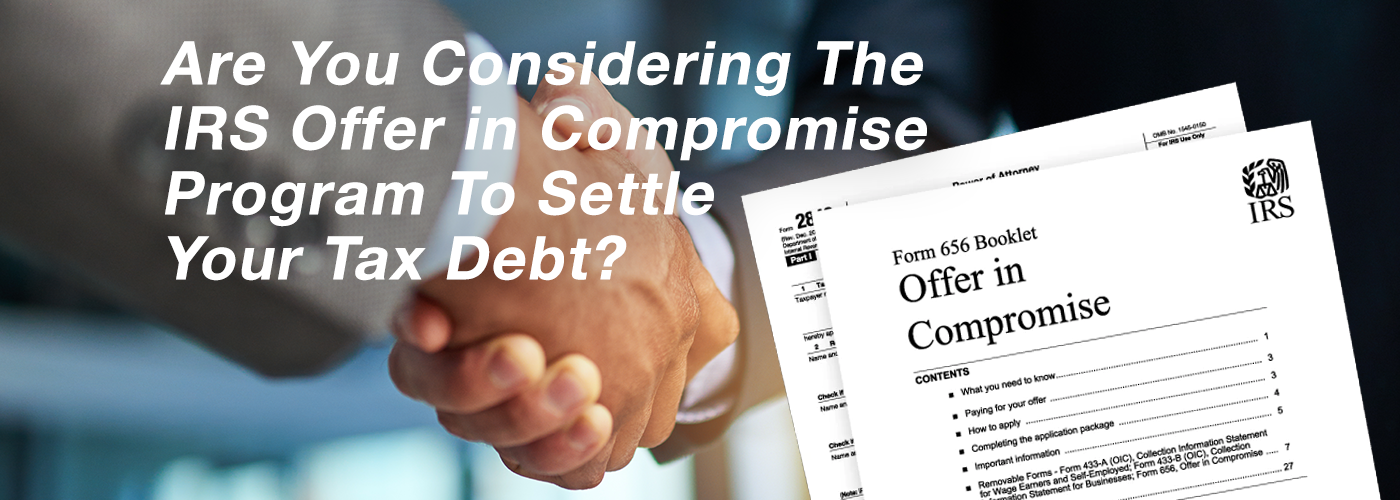Are You Considering The IRS Offer in Compromise Program To Settle Your Tax Debt?
It just got more expensive to settle your tax debt with the IRS. The Application Fee for Offers In Compromise submitted on or after April 27, 2020 increases from $186.00 to $205.00.
An Offer in Compromise (OIC) is an agreement between a taxpayer and the IRS to settle a tax debt for less than the full amount owed. Generally, it may be an option for taxpayers who can’t pay their full tax debt, or if doing so would create a financial hardship. The IRS considers the taxpayer’s overall financial circumstances when considering an OIC in an effort to administratively resolve the amount due.
Taxpayers who want to avail themselves of the IRS Offer in Compromise program file a formal application, in which they propose to pay less than their total obligation amount (taxes, interest and any associated penalties). That much is straightforward. But as another adage goes: “the devil is in the details,” and that is where many taxpayers head in the wrong direction, and make an already challenging and stressful financial situation exponentially worse.
Here are the four biggest pitfalls:
IRS Offer in Compromise Myth: Taxpayers only need to petition the Federal government to take advantage of the program.
The Facts: Many States have Offer In Compromise programs, and each has its own qualifying standards. Taxpayers who owe money to both the IRS and their respective State tax agency must coordinate the filings in order to facilitate a mutually acceptable resolution. Just dealing with the IRS is not enough, and the IRS is under no obligation (and will not) reach out to their State-level counterparts. The onus to do this is completely on each taxpayer.
IRS Offer in Compromise Myth: Filling out the proper forms is time consuming, but does not require expertise.
The Facts: The vast majority of taxpayers do not have requisite knowledge of the IRS collection process for their petition to be successful, regardless of how much time they allocate to their application. While the lists of common errors is long, among the most frequent are: overstating assets and income (and therefore offering the IRS too much); failing to submit the proper application fee and a deposit for the amount offered; and failing to include proper financial disclosure. And if you are still not convinced: the Federal government’s own figures show that 75 percent of applications are returned due to forms being filled out incorrectly, and of the 25 percent that are processed, approximately 50 percent are rejected.
IRS Offer in Compromise Myth: Third-party firms and consultants can help you settle your debt and enjoy a “big discount.”
The Facts: This is false advertising at its worst, since the consequences here can be life-altering. These firms and consultants have no idea what your tax situation is like, and therefore cannot even promise that the IRS will accept your petition, let alone allow you to enjoy a “big discount.” Only a qualified and experienced professional who has analyzed your specific financial details, and who knows the IRS rules and guidelines inside and out (including material that is not easily available to the public — or comprehensible even when it is) can determine your eligibility for an Offer In Compromise.
IRS Offer in Compromise Myth: If you owe money to the IRS, then you submit an application right away to stop collection action or interest while your case is being reviewed.
The Facts: Before the IRS will even consider your application, they will check to see where you are current with all filing requirements. If anything is overdue, or if you are in an open bankruptcy proceeding, then your application will be returned to you.
The Bottom Line
The IRS Offer in Compromise program has the potential to be substantially beneficial for qualifying taxpayers who (and this is the most critical part) complete and submit their application properly, completely and effectively. The IRS assesses applications on a case-by-case basis, and the more boxes you check, the more likely you are to be granted financial relief. Conversely, if you get trapped by any of the myths above — or dozens of others that endure — not only will your application be rejected and returned, but your debt will continue piling up by the day.
What Should You Do?
The tax attorneys at the Law Offices Of Jeffrey B. Kahn, P.C. located in Orange County (Irvine), Los Angeles and elsewhere in California are highly skilled in handling tax matters and can effectively represent at all levels with the IRS and State Tax Agencies including criminal tax investigations and attempted prosecutions, undisclosed foreign bank accounts and other foreign assets, and unreported foreign income. And if you are involved in cannabis, check out what a cannabis tax attorney can do for you. Additionally, if you are involved in crypto currency, check out what a Bitcoin Tax Attorney can do for you.




